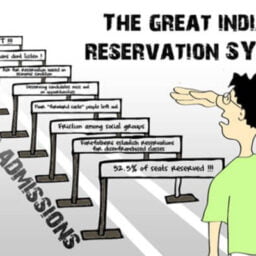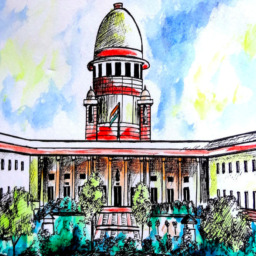“Marriage is the most natural state of man, and the state in which you will find solid happiness.”
– Benjamin Frank
INTRODUCTION
Marriage is said to be the holy wedlock between two persons that unites them into a conjugal relationship. This relationship forms the primary institution of our society because it regulates the family structure of the same. There are no societies around the globe where there is an inexistence of marriage and is the primary institution of the same. When marriage is glorified to such an extent everywhere, does not it confer the right to choose the partner of choice? Thus, the right to marry a person of your choice is a fundamental right enshrined under Article 21 of the Indian Constitution and allows the will to marry the person of your choice. This right not only provides for the happiness of the parties but also directs towards the freedom of a life based upon own choice. Marriage connotes one of the most important decisions of life and, not being able to marry the person you want leads to unhappiness. Freedom exists when a person is happy to be with their partner of choice.
OVERVIEW OF THE RIGHT TO MARRY UNDER ARTICLE 21
A marriage-related issue is guarded by the respective statutes and Acts[1] enacted by the Government. But the “right to marry” is an exclusive right included in Article 21 of our Indian Constitution. Not only the right embodies the freedom to choose their marital partner but also bestows the right to start a family. No person outside the domain of this institution can coerce others to choose someone else. Article 21 of the Indian Constitution enshrines the right to life with dignity and, dignified life indicates to the point of consideration that the persons have the right to choose their marital partner. Marriage denotes wedlock which possesses the peak of privacy, and no person shall be allowed to infringe such. When the persons attain the marriageable age, they have the freedom to choose their loved ones, and no laws of the land can bar them from doing so as it is their right. This right has been stated under the Human Rights Charter, embodying the meaning of the right to start a family.
Lata Singh v. State of U.P[2]
The foremost case which ushered this exclusive right was about marriage being an inter-caste one. The Supreme Court held that the petitioner possessed the right to marry the person of her choice as she was a major. Thus, there cannot be any objections because it was an inter-caste marriage. The case had set an example that the fundamental right to choose the marital partner of your choice can be practised by all irrespective of the caste the parties belonged to. Discrimination cannot be made on caste-based issues.
VALIDITY IN THE EYES OF THE SOCIETY
The Indian society is patriarchal in nature which ushers to the belief that the marriages taking place are arranged by the head of the family. If anyone is found to be diverting from this tradition, then the young adults are subjected to grave humiliation by their family members. Marriage in society takes place as a ceremony carried out to lift the burden. But, they tend to forget that happiness is the key to life, and choosing the wrong partner can provide for lifelong unhappiness along with domestic violence, marital rape, and more severe outcomes. Children born out of such marriages usually get neglected due to the fact of an unhappy life. When marriage is a forced one, it leads to a family void of any togetherness thereby leading to social disorganization.
Time and again, the courts have upheld that marriages should fall under personal decisions rather than societal matters. Though the relenting of the family members is of great importance, the decision to spend the whole life with someone else should be private in nature. Societies always view such marriages as institutions that exist to perish the culture and traditions of their ancestors, but in reality, the ones who choose their partners usually lead a happy life.
JUDGMENTS
Over the course of years, the Courts have directed various judgements symbolising the “right to marry” included under Article 21. Through the case of Shakti Vahini v. Union of India[3], the Court opined, “It has to be sublimely borne in the mind that when two adults consensually choose each other as life partners, it is the manifestation of their choice which is under Articles 19 and 21 of the Constitution. Such a right has the sanction of the constitutional law and, once that is recognized, the said right needs to be protected…..”[4] Here, CJI Dipak Mishra has asserted that the choice of a life partner is a part and a parcel of the ideologies of liberty and dignity. Thus, coercing someone would amount to snatching away the freedom to live their own life. Another judgment through which the “right to marry” was realized was in the case of Shafin Jahan v. Ashokan K.M and others[5]. The Court has considered Article 16 of the Universal Declaration of Human Rights and reiterated that the right to marry a person of own choice is an integral part of Article 21 of the Indian Constitution. In this way, the fact that got highlighted was that the right to life does not guarantee a dignified life but also the right to form decisions on matters about personal happiness.
Marriage is not only defined among heterosexual couples but also extends to same-sex couples as well. But, do same-sex couples possess the right to choose their marital partner? The answer to this question shall be that the ‘right to marry’ guaranteed under Article 21 of the Constitution extends to all the citizens in India irrespective of their sexual orientation or gender. Through the landmark judgement of the case pertaining to Navtej Singh Johar v. Union of India[6], the Court declared section 377 of the IPC 1860[7] as a violative provision of the freedom of expression stated under Article 19(1)(a) and equality before the law enshrined under Article 14. Previously the section prohibited sexual intercourse between same-sex couples but, now the same-sex couple can choose a partner of their own. This judgement had broadened the horizon of life as the people belonging to the LGBTQ community would be subjected to the same respect as the other couples in the society.
The acts in India which guarantee the right to marry are –
- The Prohibition of Child Marriage Act, 2006
- The Family Courts Act, 1984
- The Protection of Women from Domestic Violence Act, 2005
REMEDIES RELATING TO THE DENIAL OF MARRIAGE
In a case where the “right to marry” has been denied to a person, certain legal remedies get available for them. The remedies are as follows:
- National commission for women:
When a woman is denied her right to marry, she can file a complaint regarding such denial and contact the same commission.
- Domestic Violence Act, 2005:
In a case, where the parents or the family members coerce a woman to get married to a stranger, the aggrieved party can file a complaint under this Act. A temporary restraining order will be issued regarding this and prevent such members from contacting the aggrieved party.
- Women Cell:
The aggrieved party can seek to file a complaint to the Women Cell of the local police where she resides. The complaint will contain such details required to make out the person coercing her.
CONCLUSION
Marriage denotes the primary institution of the society that will exist till the society perishes. Freedom to choose and live life on your terms is the key to happiness. But, society tends to forget that coercing someone will eventually lead to disruptions in the family structure. When someone attains the legal age of marriage, they can enjoy the right to marry, the right to start a family, and the right to love whomever they want. Heterosexual couples can claim their rights, but still, there is a long way for the acceptance of same-sex marriages in our country. Freedom cannot be coerced on someone but can only be experienced by the person claiming it.
Author(s) Name: Mukulita Dutta (S.K. Acharya Institute of Law, Kalyani)
References:
[1] Hindu Marriage Act, 1955
[2] Lata Singh v. State of U.P. [2006] 5 SCC 475
[3] Shakti Vahini v. Union of India [2018] AIR 1601 SC
[4] Dormaan J Dalal, ‘The fundamental rights to marry in India and its application to same-sex marriage’(Bar and Bench, 3 Jan 2021)https://www.barandbench.com/accessed on 14 October 2021
[5] Shafin Jahan v. K.M.Ashokan and Ors [2018] AIR 357 SC
[6] Navtej Singh Johar and Others v. Union of India [2018] AIR 4321 SC
[7] Indian Penal Code, 1860
















